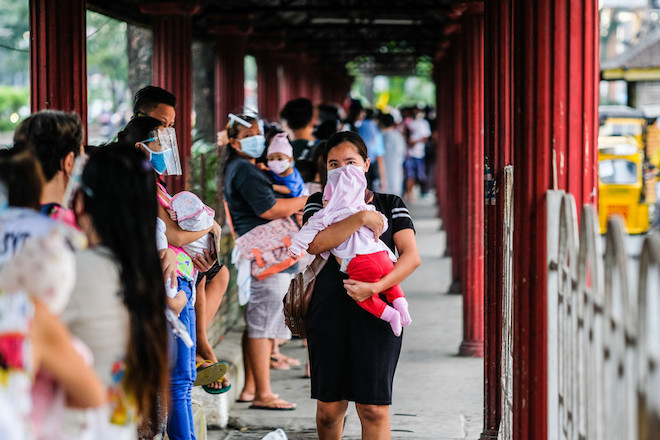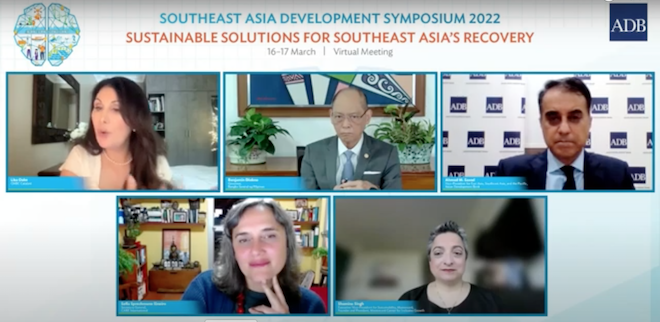
After an extraordinarily challenging 2 years, recovery in Southeast Asia is now taking shape. However, the region’s ascent out of the crisis remains fragile and uneven.
In the Southeast Asia Development Symposium (SEADS) 2022 plenary panel, “Building Back Better through Inclusive Solutions,” moderated by Lisa Oake of CNBC Catalyst, Asian Development Bank (ADB) Vice-President for East Asia, Southeast Asia, and the Pacific Ahmed M. Saeed, Bangko Sentral ng Pilipinas Governor Benjamin Diokno, CARE International Secretary General Sofia Sineiro, and Mastercard Executive Vice-President for Sustainability and Mastercard Center for Inclusive Growth Founder and President Shamina Singh discussed the critical interventions to cushion the lingering impacts of the coronavirus disease (COVID-19) pandemic, and build a model of prosperity that benefits all through people-centered solutions and cross-sectoral partnerships.
Serious setback to development progress
The pandemic has laid bare the fragilities of our economic and social systems and amplified the inequalities plaguing our society. “The reality is COVID-19 has been a disease that discriminates,” said Saeed. “It has hurt the vulnerable countries the most, [and] it has hurt the most vulnerable people in those countries.”
With the crisis further delaying the attainment of gender parity to 135 years, Sineiro urged placing women and girls at the heart of reinvigoration programs. The need to integrate gender considerations to recovery efforts was echoed by Singh, who noted how the pandemic has widened gender gaps and left many informal workers—who are predominantly women—exposed to risks of poverty due to income loss and lack of social safety nets.
But while COVID-19 has set the region back across many spheres, it has provided an opportunity for countries like the Philippines to implement measures in building its economic resilience. “We didn't sit idly by during the pandemic, but pursued game changing structural reforms,” said Diokno. “With our push for structural reforms, digitalization, and sustainability, we aim to see a Philippine economy that is stronger, more technologically savvy, more inclusive, and more sustainable than ever.”

Collective action for a balanced recovery
Even though the region is well-positioned to rebuild its economy, Southeast Asia faces significant headwinds. The remaining challenges underscore the value of deepening partnerships between governments, private sector, civil society organizations, and development institutions to promote a balanced recovery. Saeed noted, “No single institution—public or private sector—has the full array of capabilities and resources required to address these challenges.” As with COVID-19, multistakeholder cooperation is essential to confront new realities in the aftermath of the pandemic. “It takes a village, it takes everybody to be focused on a common purpose,” he added.
Singh described how Mastercard collaborates with governments and multilateral institutions like the ADB to bring tech-enabled customer-centric solutions, provide education and awareness, and create the enabling environment to strengthen customer protection and foster financial inclusion. As the pandemic has accelerated digitalization, Mastercard has also partnered with civil society organizations like CARE International to help female entrepreneurs thrive in the digital economy.
The panel also emphasized the imperative to regenerate economies on a greener foundation to make recovery truly sustainable. Drawing from lessons of the COVID-19 crisis, panelists highlighted the importance of proactiveness and preparedness for climate change, which is already causing widespread and increasingly irreversible disruptions. In the Philippines, Diokno shared how the central bank supports the climate transition through sustainable finance policies, harnessing the ability of banks to support green and climate investments. Meanwhile, ADB—the climate bank of Asia and the Pacific—has raised its climate commitment to $100 billion from 2019 to 2030. Beyond financing, ADB advocates for a multifaceted approach to climate action that is incorporated with a gender lens to ensure the benefits of a net-zero economy are distributed evenly. Sineiro mentioned the immense opportunity that lies at the intersection of green jobs and gender equality, citing how investing in women could unlock $160 trillion of global wealth.
As countries in Southeast Asia pivot away from the pandemic, there was a broad agreement among panelists that an equitable and enduring recovery hinges on a people-centered approach to revitalization programs. One lesson from COVID-19 is how interconnected and interdependent societies are. Thus, harnessing the best assets of public and private institutions across sectors will be key to navigating the complex and intertwined challenges of the post-pandemic development landscape, as well as shaping a new normal where no one is left behind.

